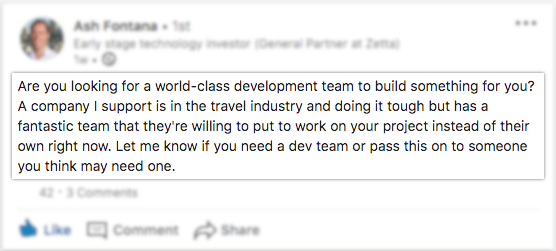Agile Minds in Desperate Times
Gam Dias

The COVID-19 pandemic is already putting businesses to the test. Business and technical agility is key to surviving the impending economical downturn. The lessons that are being learned will be the making of a new generation of successful businesses.
Pivoting in a Crisis
Organizations around the world are being put under stress in this time of global crisis. In all sectors, B2C businesses and their B2B partners are shocked as sales evaporate overnight. They enact their contingency plans to conserve cash, furlough staff, and freeze businesses. Travel businesses hardest hit, Delta Airlines has been swift to extend status benefits to their loyalty program members. Even startup VCs are working hard to help their investments survive.

Amidst this chaos there are companies that are shifting operations, marketing and distribution to survive and thrive:
- Top Cuvée, a local wine bar and off license becomes Shop Cuvée delivering food, drink and toiletries to their customers.
- Netflix Party allows you to watch movies and TV shows with friends, wherever you are and also has group chat so you can react and discuss together.
- Spiffy, the US on-demand car cleaning service have rolled-out a service to sanitise facilities and properties.
- In London, Experience Haus has created OpenHaus, a series of virtual workshops to join for free throughout April, to keep on learning while self-isolating.
- Tunisian taxi startup IntiGo has temporarily become a delivery service. For $4/hour, the company will deliver groceries and other products to customers.
- LubbDubb, a San Francisco Bay Area-based booking platform for fitness instructors became a directory for online classes taught via Zoom.
Comfort in Liquor and Chocolate
These shifts require business agility, and that is much more than a mindset:
Two weeks into self-quarantine, grocers in Spain see sales uplifts in alcohol and chocolate categories. Another data point shows consumers are sending electronic gifts to each other to be redeemed when shopping restrictions are lifted is yet another trend. There is a US-based omni-channel home and garden retailer with an extensive beer, wine and speciality foods assortments who have closed their stores during the lockdown. This may be the opportune time for them to rapidly create a new proposition for digitally gifting chocolate and wine.
The Agile Organization
So what’s it going to take to make bold agile moves such as this?
- Prior investment in digital business: to ensure that the e-commerce infrastructure is robust and scalable
- Ongoing innovation to respond to consumer preferences: for electronic gift certificates and next day delivery
- Processes that monitor business environment and disseminate that information internally: bring the newest trends to their attention
- Autonomous decision making processes: that can respond fast to local and temporal changes without lengthy approval processes
- A performance measurement system that values bottom line contributions: to not penalize well-thought out disruptive innovation
- Configurable systems that can be quickly re-parameterized: to target different audiences with new propositions
- Business processes that can flex on top of optimized infrastructure: so that team members and partners are operationally efficient
Agile minds will have thought about these things long before any crisis occurred, so it’s not a huge step to re-tool, re-configure and re-market a new proposition.
Build for Business Agility
The current crisis will trigger many changes in society. Consumers are being forced to explore new ways to live, work and play. There will be widespread adoption of video conferencing, remote working, click and collect shopping, and a cashless society. Customers will experience the benefits of digitization and the services themselves will be honed through mass adoption. The organizations that are unable to respond to these changes will fail. The survivors will be a new generation of organizations built for agility.
References:
- Delta Airlines: Extends Medallion Status, Club Memberships and more to support SkyMiles Members’ future travel
- LubbDubb: A Startup Helps Fitness Instructors Stay Flexible
- MaddyNess: 19 businesses pivoting in response to COVID-19
- El Pais: Why are Spaniards buying more beer and chocolate under the coronavirus lockdown?
Don’t Offer Privacy, Build Relationships Instead
Gam Dias
Last week’s WhatsApp-Facebook data sharing announcement prompted a flurry of contacts to join me on the secure messaging platform, Signal. Mainstream documentaries, movies and books are waking c...
10 Reasons You Don’t Need a Data Strategy
Gam Dias
Organizations are recruiting and appointing Chief Data Officers to develop new data driven cultures and business-driven analytics programs, but sometimes having that person can be vastly overrated, no...

